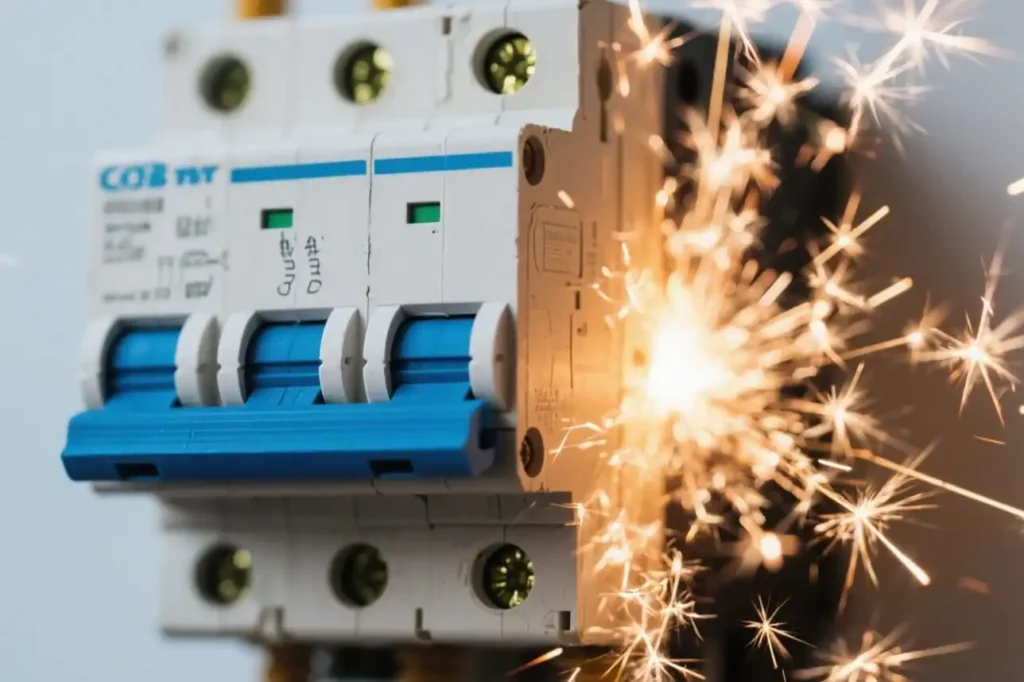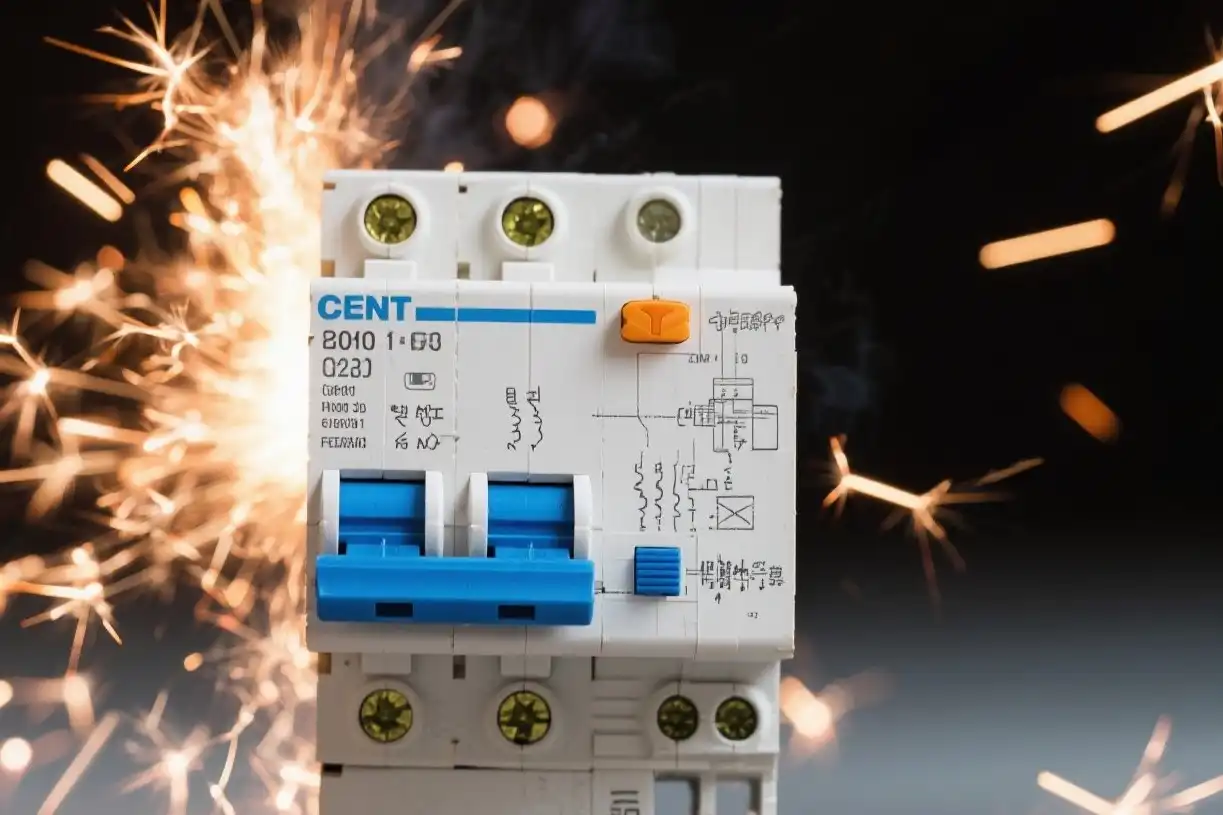When the circuit breaker generates sparks, it is very dangerous. The circuit breaker generates sparks usually because too many devices are using power on one circuit. Sometimes a hot wire touches a neutral or ground wire, causing the circuit breaker to generate sparks. Loose wires, broken circuit breakers, or old wiring can also cause the circuit breaker to generate sparks. Any of these problems can hurt you or damage your house.
Cause Explanation Overloaded Circuits Too many things use power on one circuit. This makes heat and can cause the circuit breaker to generate sparks. Short Circuits A hot wire touches a neutral or ground wire. This lets too much electricity flow and makes the circuit breaker generate sparks. Ground Fault Surges A hot wire touches the ground or metal that is grounded. Water can make this problem worse, causing the circuit breaker to generate sparks. Aged or Damaged Wiring Old or broken wire covers can cause shorts. This leads to the circuit breaker generating sparks and trips the breaker. Loose Wire Connections Loose wires get hot and make the circuit breaker generate sparks inside panels or wires. Failed Circuit Breakers Old or broken breakers can spark and trip for no reason. This is not safe.
You should never ignore these warning signs. Acting fast can keep people safe and protect your home.
Key Takeaways
- Circuit breakers spark mostly because of too much power, short circuits, loose or broken wires, electrical arcing, bad breakers, or broken appliances. Sparks from a circuit breaker are very dangerous. They can start fires, give electric shocks, or hurt your home’s electrical system. Look for warning signs like sparks you can see, burning smells, popping noises, heat, or color changes near outlets and breaker panels. If you see sparks or smell burning, turn off the main power right away. Call a licensed electrician for help. Check your wires and breakers often. Do not put too many things on one circuit. Change old or broken parts to keep your home safe.
The Circuit Breaker Generates Sparks: Main Causes
Overloaded Circuits
If you plug in too many things, the circuit can get overloaded. Every circuit has a safe limit called amps. For example, a 15-amp circuit should not go over 12 amps for a long time. If you use more power, the wires get hot. This heat can make the circuit breaker generate sparks. Overloaded circuits often happen in kitchens or living rooms. Workshops with lots of tools can also have this problem. Try to keep the number of devices low. This helps stop sparks and keeps your home safe.
Tip: Count how many things are plugged into one outlet or power strip. If lights flicker or outlets feel warm, you might have an overloaded circuit.
Short Circuits
Short circuits are a main reason the circuit breaker generates sparks. A short circuit happens when a hot wire touches a neutral or ground wire. This lets a lot of electricity flow at once. The surge can be much higher than normal. You might see a blue flash or hear a loud pop. Short circuits can come from broken wires or water in outlets. Bad appliances can also cause them. Sometimes, pests chew wires or nails hit wires in walls. When the circuit breaker generates sparks, a short circuit is often the cause.
- Common sources of short circuits:
- Old or broken wiring, especially in older homes
- Water leaks near outlets or lights
- Loose wires inside electrical boxes
- Broken outlets or switches
- Rodents chewing on wires
Loose or Damaged Wiring
Loose or damaged wires are another reason the circuit breaker generates sparks. Loose wires do not connect well. This makes electricity jump and causes heat and sparks. Damaged wires with broken covers or exposed copper can also spark. You might hear buzzing or smell burning. Sometimes, you see black marks on outlets. These signs mean you need to fix the problem fast. Loose or damaged wiring can cause power loss, tripped breakers, or even fires.
- Signs of loose or damaged wiring:
- Buzzing or humming from outlets
- Burning smells or sparks you can see
- Outlets that look burned or feel hot
- Lights that flicker
Electrical Arcing
Electrical arcing happens when electricity jumps through the air. This jump makes a bright flash and loud sound. Sometimes, you see sparks fly. Arcing starts with loose or rusty connections or damaged wires. Overloaded circuits can also cause arcing. The heat from arcing can break wire covers and make the circuit breaker generate sparks. You might see flashes or smell burning near the breaker panel. Arcing is very dangerous and can start fires fast. Special breakers called AFCIs can help stop arcing before it gets worse.
Faulty or Old Breakers
Old or broken breakers can make the circuit breaker generate sparks. Breakers get worn out after many years. Rust or broken parts inside can cause bad connections. Bad connections make heat, buzzing, and sparks. Sometimes, the breaker does not trip when it should. This lets heat build up and can be dangerous. If you see black marks, smell burning, or hear odd sounds from the breaker panel, your breaker may be bad. Checking and replacing old breakers can help stop these problems.
- Common faults in old breakers:
- Loose wire nuts or bad connections
- Arcing from worn parts
- Breakers that stick or do not trip
Malfunctioning Appliances
Broken appliances can make the circuit breaker generate sparks. They can cause short circuits or ground faults. If an appliance has a broken cord or plug, it can let a hot wire touch a neutral or ground wire. This sends a big current through the breaker and makes it spark and trip. Sometimes, the problem is inside the appliance, like a stuck or hot motor. Always unplug any appliance that smells burnt or makes weird noises. Stop using it if it trips the breaker.
Note: If you see sparks after plugging in a device, unplug it right away. Have a professional check it before using it again.
Dangers and Risks

Fire Hazard
A sparking circuit breaker can cause a fire at home. When wires get too hot or connections are loose, sparks can jump out. These sparks can light things nearby on fire. You might see lights flicker or smell something burning. Sometimes, you may see black marks near outlets. These signs mean there is a problem. If the breaker does not trip, wires can get even hotter. This can start a fire. Many house fires happen because of electrical problems like this. Always pay attention to these signs to keep your family and home safe.
Tip: If you see melted wires or smell burning near your breaker panel, turn off the power and call an electrician right away.
Electrocution
Electricity is very dangerous if it gets out of damaged wires or bad breakers. When the circuit breaker generates sparks, electricity is not staying in the wires. If you touch a sparking breaker or bare wires, you can get shocked. Water leaks or damp places make the risk higher. Even a small shock can hurt you. A strong shock can be deadly. Always keep your hands dry. Never touch a breaker that looks broken or feels hot.
- Signs of electrocution risk:
- Sparks or flashes from the breaker
- Breakers that feel warm or buzz
- Outlets with black marks
Electrical System Damage
Sparking breakers can hurt your whole electrical system. Too much heat and arcing can melt wires and damage outlets. If you do not fix these problems, repairs can cost a lot. You might even need to replace parts of your electrical panel. Damaged wires can also make other circuits stop working. This can cause more problems in your house. Doing regular checks helps keep your system safe and working well.
Remember, circuit breakers are made to stop problems before they get worse. If you see any warning signs, act fast to avoid bigger problems.
Warning Signs
Visible Sparks
You may see sparks when you open your breaker panel or plug in a device. Visible sparks often mean something is wrong, such as damaged insulation, moisture, or a power surge. These sparks can warn you before a bigger problem happens. However, many electrical fires start from hidden arcing that does not show visible sparks. You should never ignore sparks, even if they seem small. If the circuit breaker generates sparks, you face a serious risk of fire or electrical failure.
⚠️ Tip: Do not rely only on visible sparks. Many problems stay hidden behind walls or inside appliances.
Burning Smell
A burning smell near your breaker panel is a strong warning sign. This smell usually means wires or parts are overheating. Overloaded circuits, faulty wiring, or a bad breaker can cause this. If you notice a burning odor, components may be melting or electrical arcing may be happening. This creates a high fire risk. You might also see discoloration or scorch marks on the panel. If you smell burning, turn off the power and call a licensed electrician right away.
- Signs to watch for:
- Burning smell near the panel
- Discoloration or scorch marks
- Breaker feels hot to the touch
Popping or Crackling Sounds
You might hear popping, buzzing, or crackling sounds from your breaker box. These noises often mean there is arcing or a loose connection inside the breaker. The sounds show that the breaker may not trip as it should, which can be dangerous. If you hear these noises, the circuit breaker generates sparks or is about to. Immediate inspection by a professional is important to prevent fire or further damage.
🔊 Alert: Any strange noise from your breaker box is a warning. Do not ignore it.
Heat or Discoloration
Touch your breaker panel or switches. If they feel hot, this is not normal. Heat means the system is overloaded or failing. You may also see black spots, burn marks, or discoloration on outlets or the panel. These signs show that wires or breakers are damaged. Ignoring heat or discoloration can lead to fires, damaged appliances, or power outages. Always check for these signs during regular home checks.
- Common warning signs:
- Hot breaker panels or switches
- Black spots or burn marks
- Frequent breaker trips
What to Do If the Circuit Breaker Generates Sparks
Emergency Steps
If you notice that the circuit breaker generates sparks, you must act quickly to stay safe. First, turn off the main power switch in your home. This step stops electricity from flowing and lowers the risk of fire or shock. Do not touch the breaker or any wires if you see sparks, smell burning, or hear loud noises. Keep everyone away from the area. If you see smoke or fire, leave your home right away and call emergency services. Never try to fix the problem yourself.
⚡ Tip: Unplug any devices from outlets that show sparks or burning smells, but only if you can do so safely.
When to Call a Professional
You should always call a licensed electrician if the circuit breaker generates sparks. Sparks are not normal and can lead to fires or serious damage. A professional knows how to find and fix the cause safely. Use the table below to help you decide when to call for help:
| Condition | Reason to Call a Licensed Electrician |
|---|---|
| Sparking wires or outlets | Sparks are a fire risk and need immediate expert attention. |
| Circuit breakers tripping frequently | Frequent trips mean there may be faulty parts or overloaded circuits. |
| Noise from breaker box | Unusual sounds signal an electrical emergency. |
| Visible damage to switches/outlets | Burn marks, melting, or heat show dangerous conditions. |
If you see visible sparks, turn off the power and call an electrician right away. Only a professional can make sure your home is safe.
Preventive Tips
You can lower the risk of sparks by following simple steps:
- Inspect wiring often to make sure it is secure and not damaged.
- Upgrade old breakers and wiring to meet safety codes.
- Replace worn-out cords, outlets, and switches.
- Use high-quality wiring and protect it from water, pests, and lightning.
- Watch for warning signs like wet spots, frayed wires, or burning smells.
- Install surge protectors if your area has many storms.
Regular checks and quick action help keep your home safe from electrical hazards.
You should see sparking circuit breakers as a big danger. Some main causes are overloaded circuits, damaged wiring, and faulty breakers. Act fast if you see sparks, smell burning, or hear buzzing sounds.
- If circuit breakers do not trip, wires can get too hot. This can melt insulation and start a fire.
- Licensed electricians should check your system often to find problems early and keep your home safe.
Watch for warning signs and get maintenance every few years to stop electrical emergencies.
FAQ
What should you do if you see sparks from your circuit breaker?
You should turn off the main power switch right away. Keep everyone away from the area. Call a licensed electrician to check the problem. Do not try to fix it yourself.
What are the most common signs that a circuit breaker is about to spark?
You may notice burning smells, buzzing sounds, or hot breaker panels. Sometimes, you see black marks or flickering lights. These signs warn you that sparks may happen soon.
What can cause a new circuit breaker to spark?
A new breaker can spark if you have loose wires, faulty installation, or damaged appliances. Sometimes, the problem comes from old wiring in your home. Always have a professional check new sparks.
What risks do sparking circuit breakers create for your home?
Sparking circuit breakers can start fires, damage your electrical system, or cause electric shocks. These risks can harm your family and your property. You should never ignore sparks.
What is the difference between normal electrical noise and dangerous sparking?
Normal electrical noise is quiet and steady. Dangerous sparking makes loud pops, crackles, or buzzing. You may also see flashes or smell burning. If you notice these, act quickly and call an electrician.
See also
Signs of damage to the circuit breaker at home
How to Diagnose Micro Circuit Breaker Malfunction in Your Home
Why a bad circuit breaker can cause low voltage
What Happens When the Miniature Circuit Breaker Is Burnt Out




